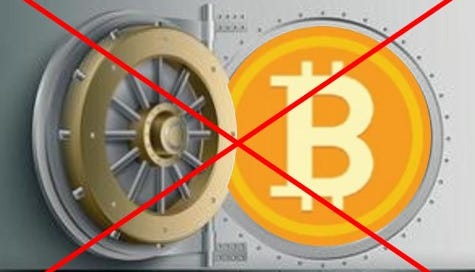Dear Readers,
Life in developed countries these days is largely dominated by the financial industry. Even in the United States, which typically falls behind its peers around the globe as far as the volume of digital payments is concerned, it’s rather uncommon to see a large amount of transactions happening with physical cash. We instead rely on an ever-increasing amount of banks and fintechs to help us conduct our daily business. And the reality is that we have little option but to use their services. Good luck trying to make a purchase on Amazon or Alibaba without a bank account or credit card.
One of the primary services offered by many companies in the financial industry is that of accepting customer deposits. While we traditionally think of deposits primarily in the context of generating interest, in today’s world of low-interest rates, that can seem far from reality. The truth is that the only worthwhile benefit received by most depositors relates to custody of their money. In other words, not having to secure or transport all of our money all the time is about as good as it gets.
That said, asset custody has a dark side: if someone else has your money, you’re at their mercy when you want to get it back. Hopefully most of us haven’t had much, if any, trouble over the years withdrawing our money, but there are plenty of examples of people who did:
The failure of the Lehman Brothers investment bank in 2008 resulted in tens of billions of U.S. dollars’ worth of losses for investors and creditors.
The Cypriot Financial Crisis of 2012-2013 resulted in portions of accounts with balances above €100,000 at several large banks in the country being seized.
Governments around the world freeze billions in assets belonging to criminals and innocent parties alike annually.
Long story short, the benefits offered by banks and fintechs can easily be outweighed in the event your access to your funds is lost or revoked.
Bitcoin to the Rescue
Bitcoin was actually created to resolve some of the issues highlighted above, as exemplified in the following quote from its pseudonymous creator, Satoshi Nakamoto:
The root problem with conventional currency is all the trust that’s required to make it work…Banks must be trusted to hold our money and transfer it electronically, but they lend it out in waves of credit bubbles with barely a fraction in reserve.
As a result, Bitcoin was originally created as a self-custodial asset, similar to cold hard cash. Anyone in the world can “be their own bank”, so to speak, and take advantage of the full capacities of the Bitcoin network without having to entrust their holdings to anyone.
Enter the New (BTC) Fintechs
That isn’t to say that Bitcoin can’t be custodied. In fact, it’s likely that most of us had our first experience with Bitcoin in a custodial environment offered by cryptocurrency exchanges like Coinbase and Binance. As the industry has grown, the amount of money to be made by crypto-banks and other Bitcoin companies has grown in tandem.
The benefits and drawbacks are largely the same when comparing custodial arrangements within the traditional and Bitcoin spaces. Bitcoin companies can offer some level of security, convenience, or income to users, but also put users at risk of losing access to their funds for a variety of reasons. I personally believe that custody services in the Bitcoin space are even riskier for individual users than comparable offerings in the traditional financial system since there are limited regulations and insurance in place to deter bad actors and subsidize losses.
On top of that, it’s far more common for crypto companies to institute enterprise-wide limits on customers’ ability to access and withdraw their funds. Crypto.com, one of the largest cryptocurrency exchanges in the world by volume, provides a recent example, having suspended withdrawals for all customers earlier this week after reporting “unauthorized activity” for a handful of users:

While some users may take comfort in the company’s statement that “security comes first”, their characterization of a total lockdown of customers’ access to their own funds as only an “inconvenience” is alarming to say the least. While Crypto.com reinstated access after less than 24 hours, there are plenty of examples of companies, like the infamous Mt. Gox, that never reinstated access at all.
The moral of this story? If you choose to entrust your holdings to a crypto company, proceed at your own risk and never deposit more than you’re willing to lose.
Read the next article in this series:
A Special Bonus For Premium Members
Don’t forget that premium subscribers to HiFi Bitcoin get exclusive access to premium educational resources at no extra charge.
Wish You Could Easily Take The Podcast With You?
Can’t Get Enough Bitcoin In Your Life? Follow Me On Social Media:
🙋🏽♂️Did You Enjoy This Edition Of The HiFi Bitcoin Letters?
This 3-question survey is your chance to tell me how I can improve the newsletter for you.
This is not financial or business advice. This newsletter and related content are for informational purposes only. Cryptocurrencies and digital assets can be risky. Always do your own research before making any sort of investment.
















Share this post